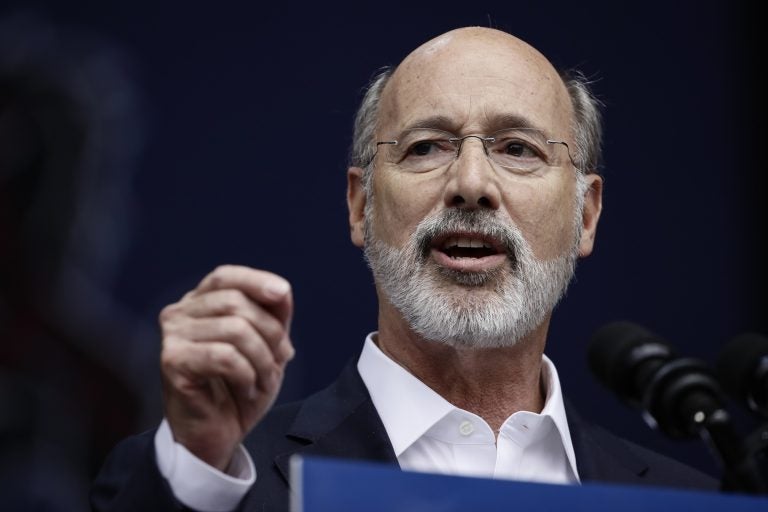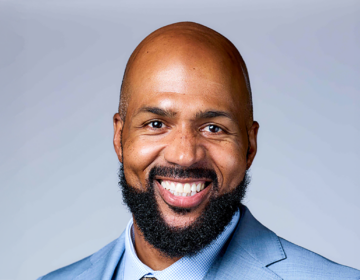State’s charter appeals board still run by Corbett appointees
This is important for Philadelphia, where marginal applications are sometimes approved for fear of costly and ultimately successful appeals to the state board.

Gov. Tom Wolf speaks at a campaign rally for Pennsylvania candidates in Philadelphia, Friday, Sept. 21, 2018. (Matt Rourke/AP Photo)
Updated 2:10 p.m. Thursday
In his entire first term in office, Gov. Wolf has not made one appointment to the state Charter School Appeal Board, leaving the decision-making body in the hands of people appointed by his predecessor, Tom Corbett.
The CAB, as it is known, has the power to reverse local school districts’ decisions to deny new charter schools or to close them. Corbett filled the body with members who have ties to the state’s charter school sector.
Wolf campaigned against Corbett’s education policies, and many say this contributed to his victory. But after four years, the CAB still consists entirely of Corbett’s appointees, who all have terms that have expired, two as early as 2015. The six-seat board also has one vacancy.
This is important for Philadelphia, which has half the charter schools in the state. The School Reform Commission, which governed the District until July, approached the evaluation of new charter proposals under the assumption that denial would trigger costly, lengthy – and ultimately successful – appeals to the CAB by the applicant. The Board of Education, which now governs the District, is scheduled to vote on its first three charter applications at the end of this month. So far it has operated under the same assumption as the SRC.
During the 2015 campaign for governor, Corbett, a Republican, supported school choice and charter expansion in districts with stressed and struggling schools. Wolf argued for more resources for education and for more generous targeting of aid to low-income, low-achieving districts.
Neither the Pennsylvania Department of Education (PDE) nor the Governor’s Office has offered any reason why making new appointments to the CAB has taken so long.
Representatives for both said that Wolf would be making new appointments “in the near future,” without specifying a date, and noted that such appointments must be approved by the Republican-controlled state Senate, which has been strongly pro-charter school.
Charter schools are publicly funded but privately managed, and they are exempt from certain state laws that apply to other public schools, such as the requirement that all teachers be state-certified in their subjects. So whether charters legally qualify as public schools is a matter of debate.
The CAB has specific requirements for each seat that were designed to create a balance of viewpoints. One seat each is reserved for:
- An employee at a university or college (currently vacant).
- A certified teacher in a public school.
- A member of the business community.
- A parent of a “school-aged child.”
- A member of the state Board of Education.
- A member of a school board.
Corbett found ways to ensure that most of his appointees were tied to the charter school sector. Not all of them still meet the requirement for the seat they occupy.
Members of the board
Mitchell Yanyanin, whose term expired in 2015, occupies the seat reserved for a school board member. Yanyanin served on the board of the New Brighton Area School District until 2015 but has since left. He ran for a seat on the Ambridge school board in 2017 but lost that race. So he no longer meets the requirement for the seat he occupies.
Like all but one member, Yanyanin has ties to the state’s charter school sector. His wife, Nancy Yanyanin, worked as the personnel director at the Pennsylvania Cyber Charter until she was fired in late 2012, along with four others in senior positions. The firings came after FBI and IRS investigations of the school, though the cyber charter denied that the firings were related to the investigations.
The seat for a certified public school teacher is held by Julie Cook, who teaches at the Souderton Charter School Collaborative. Her term expired in June 2018.
Vice Chair Lee Ann Munger occupies the seat for “parent of a school-aged child.” In 2007, her two children attended Propel Charter School. The charter school’s application to open was initially denied by the local school district, but later reversed by the Charter Appeal Board – a decision that Munger praised at the time before Corbett appointed her to the appeals board. Her term ended in 2017.
Jonathan Peri, whose term also ended in 2017, holds the seat for a state Board of Education member. Though the governor has not replaced Peri on CAB, a year ago Wolf appointed him to be chair of the Higher Education Council for the state Department of Education. Peri is the president of Manor College, a small Catholic school in Jenkintown, Montgomery County. He was also chairman of the board of trustees at the Walden School, a private religious school in Media. And he’s been a trustee at Archbishop Ryan Catholic high school in Philadelphia.
The vacant seat is the one designated for a college or university official.
The only member without public ties to charter or religious schools is Scott Miller, the board’s business manager, who is the dean of the School of Business at Edinboro University in Pennsylvania. His term ended in 2015.
Politics in Harrisburg
“The current members of the Charters Appeals Board continue to serve and carry out their responsibilities,” said PDE spokesperson Eric Levis. “The governor expects to nominate members to the board in the near future.”
Levis stressed that the nominations must be confirmed by the Republican majority in the state Senate. The Governor’s Office confirmed that negotiations on who might be confirmed have begun, but declined to provide further details.
Donna Cooper was secretary of policy for Democratic Gov. Ed Rendell and is now the director of Public Citizens for Children & Youth, an advocacy group that seeks more accountability for the state’s charter schools. Cooper said having a Republican-controlled state Senate is no excuse for four years of inaction that have left Corbett’s appointees in place.
“They do have to negotiate with the Senate, but that isn’t a reason to avoid making appointments. That’s a reason to find pathways to get it done,” she said. “Typically, [appointments that require Senate confirmation] are not just traded within a board or committee, but throughout the whole state.”
In other words, the governor could get GOP senators’ votes for his CAB appointments by offering unrelated appointments or patronage jobs in exchange.
“They always want to trade more generously for paid positions,” Cooper said. “This is not a paid position. They may have a hearing examiner, with a generous salary, who hears workers’ comp cases – you could trade that appointment for one or maybe even two CAB members.”
Cooper thinks these negotiations should have started when Wolf first entered office.
“Clearly, the Wolf administration may have decided there were boards and commissions more important than the CAB and they may have made trades on those, but I would wonder what they were,” she said. “There are only a few other boards more powerful than the Charter Appeal Board.”
Consequences of different legal interpretations
The board is responsible for interpreting the state’s charter school law, and because most members are not lawyers, they rely on their legal counsel to help interpret the law. The current counsel, Alaina Koltash, was hired by Corbett’s Department of Education in 2011.
Susan DeJarnatt, a professor of legal research at Temple University and a critic of the state’s charter law, illustrated the importance of how that law is interpreted through her recent work on the legality of denying proposed charters if they would harm a district’s financial ability to educate its other students.
Most lawyers interpret the state’s charter school law to mean that a district can never deny a charter for financial reasons – even if approving that charter would bankrupt the school district. Under Corbett, that was how the appeals board interpreted the law. But other lawyers, such as DeJarnatt and David Lapp, formerly of the Education Law Center and now with Research for Action, have publicly disagreed with that interpretation.
DeJarnatt’s comprehensive study of all appeal board rulings that mentioned financial impact on the local school district demonstrated her point. She found cases where parents from nearby school districts filed a complaint about the financial impact on their districts because those districts have to pass on the required per-pupil payment. CAB considered the cases, then dismissed them on the grounds that “taxpayers in adjoining districts don’t have standing to complain.”
If the favored interpretation is correct – that financial impact can never be a factor in deciding whether to approve a charter – the cases would have been dismissed on those grounds, not on the question of standing.
In those cases, the CAB “did not say: authorizers can never consider the financial impact on anyone,” she said.
The assumption that the charter law prevents consideration of financial impact is based on a clause within the law that states reasons for which authorizers can consider the denial of a charter “including but not limited to the following.” But the “following” does not include the financial impact on the school district.
“When you have that kind of ‘including but not limited to’ language in a statute, it means the following list is not exclusive. That’s a basic interpretation,” DeJarnatt said. She cited the courts’ treatment of the Fair Debt Collection Practices Act, which contains a similar “included but not limited to” clause. Those court decisions conclude that just because something is not explicitly included in the list doesn’t mean it must always be excluded.
The CAB, still dominated by members with ties to the charter school sector and a lawyer hired by Corbett, has chosen to interpret some of these cases in the opposite way, DeJarnatt said.
She argues that this interpretation may violate the state’s constitution, which has a clause that mandates the state “provide for the maintenance and support of a thorough and efficient system of public education.”
Individual laws cannot be interpreted in ways that violate the state’s constitution, and some lawyers contend that the CAB flouts that constitutional obligation. DeJarnatt was clear that her interpretation would not allow a school district to deny any and all charters. But it would allow a financially strapped district like Philadelphia, which already has more than 80 charter schools enrolling 70,000 students, to deny further charter schools until it had more than enough money to “thoroughly and efficiently” educate students in its existing schools. Payments to charter schools constitute the single largest line item in the District’s budget, nearly $900 million.
“The non-renewal process for existing charters can take years; the legal fight could take even more years if they appeal,” DeJarnatt said. All of this represents legal fees for the local school district if it attempts to close the school. But DeJarnatt noted that those fees are usually significantly less per year than the amount spent annually on any existing charter school.
Annual legal fees could run up over $100,000 on each side. But the cost of keeping even a small charter open is many times that amount. A charter with just 500 students receives over $4.5 million each year from the school district – and that’s a lowball estimate that assumes the school has no special education students and does not rely on the school district to pay for school bus services. Both are highly unlikely scenarios.
Calls for action
Analysis by the Education Law Center of Philadelphia has found that charter schools disproportionately enroll students with low-cost disabilities in order to get more dollars from the funding formula and that some even discriminate against students with expensive disabilities. The center called on the governor to appoint CAB members who will protect the rights of marginalized students.
“We know from our work that many of the students who are most likely to be marginalized, stigmatized, and underserved are being denied access to charter schools or illegally ejected in violation of their rights as students with disabilities, English learners, and children experiencing homelessness,” said Reynelle Brown Staley, policy director at the center. “And charter schools contribute to the significant racial disparities in public education that affect students of color. We need all CAB appointees to provide vigilant oversight and enforcement of the rights of these students across the Commonwealth.”
Cooper’s organization, PCCY, has recommended the charter law be amended to limit the grounds for which denials can be appealed to the CAB. This would reduce the money spent by school districts on legal costs, she said. Districts effectively pay for the lawyers on both sides, because charter schools pay their legal costs out of tuition dollars sent by the local school district.
“It is a terrible black mark on the Wolf administration that they have failed to follow up on this,” Cooper said. “And that’s not to say those individual Corbett appointees are bad people. They might be fair.
“But given the implications [of charter growth] in York, and Philadelphia, and Lancaster, and Allentown, and Pittsburgh – places where people voted for Tom Wolf because of his stance on education – their district’s financial conditions are dramatically affected by this board, and it’s the onus of the administration to do everything they can to protect them.”
—
Editor’s Note: The article has been updated to reflect that the Walden School is a private religious school, not a charter school and that Jonathan Peri has left the boards of the Walden and Archbishop Ryan schools.
WHYY is your source for fact-based, in-depth journalism and information. As a nonprofit organization, we rely on financial support from readers like you. Please give today.





